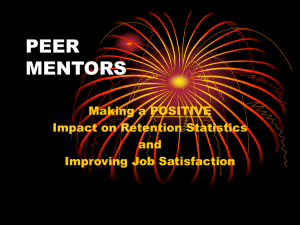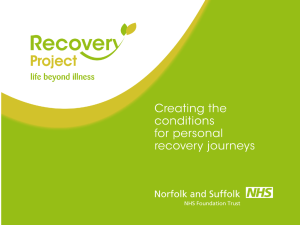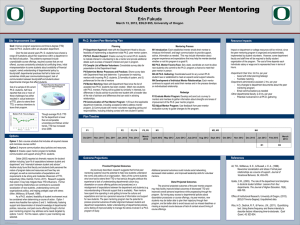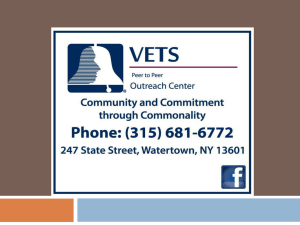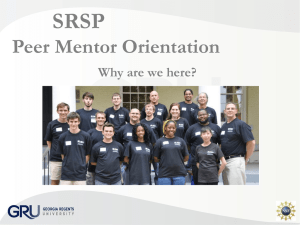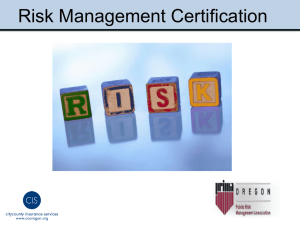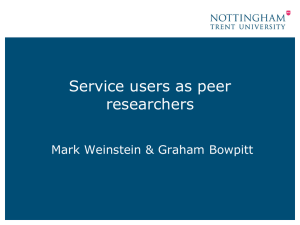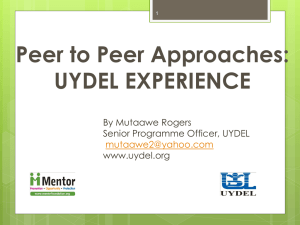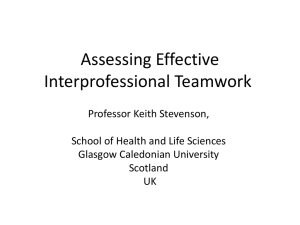Peer Mentor Training Program
advertisement
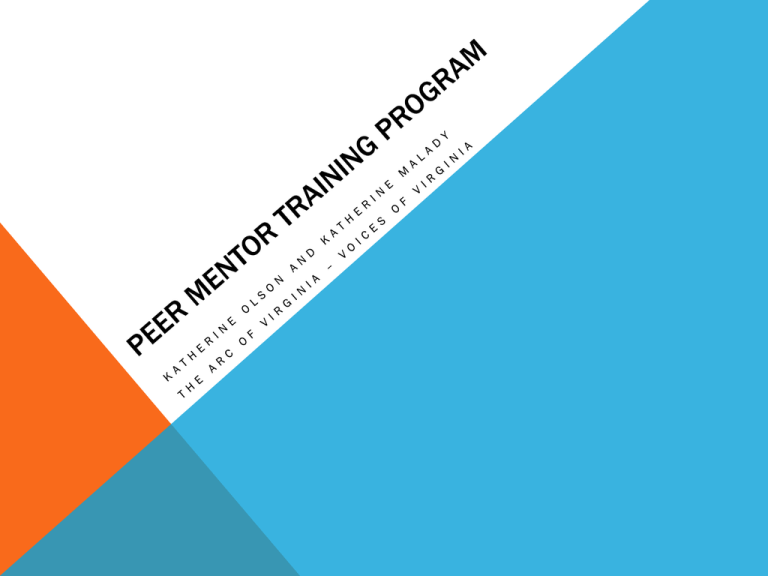
LAYING THE FOUNDATION FOR VIRGINIA’S PEER MENTORING NETWORK The Arc of Virginia is partnering with the Commonwealth of Virginia’s Department of Behavioral Health and Developmental Services and Hope House Foundation to launch a statewide Peer Mentoring Network. The program will connect individuals transitioning out of state-operated Training Centers with individuals with intellectual and developmental disabilities (ID/DD) currently living and receiving integrated services in the community. PROGRAM PARTICIPANTS: • 15 Self-Advocates that will be trained to become Peer-Mentors • 15 Support Partners that will each work in partnership with a PeerMentor • 15 Training Center Residents that will be paired up with trained Peer Mentors • 15 Community Residents that are seeking improved community-based services PEER MENTOR TRAINING PROGRAM The first step towards developing this network is the Peer Mentor Training Program! This program will train fifteen individuals with ID/DD to become skilled Peer Mentors, providing them with a strong understanding of the service system and excellent mentorship skills. The program consists of a 12–month training course and a 6-month mentorship period, during which time the participants will mentor one training center resident and one individual living in the community desiring access to more integrated community-based services. Upon completion of the program, participants will be prepared to serve as skilled Peer Mentors. WHAT IS A PEER MENTOR? Peer – someone who is equal to another person in a shared trait: Abilities Background Qualifications Employment Age Gender Mentor – a wise and trusted counselor or teacher Peer Mentor – someone that helps others: • Learn how to speak up for themselves . • Understand and advocate for their own rights • Understand and make informed decision . SELF-ADVOCACY VS. PEER-ADVOCACY Advocacy Speaking up for rights Self-Advocacy Speaking up for your own rights Peer-Advocacy Helping others to speak up for their own rights WHY IS THE PEER PART SO IMPORTANT? It is helpful to have someone that has experienced the same things you have experienced A peer understands and knows the system for the inside Support staff is always saying how it should be, but the person with the disabilities knows it better than the support staff WHAT DOES IT TAKE TO BE A PEER MENTOR? It is a job Helping other people understand their rights and options Helping people figure out what they want and need based on their options Helping people get what they want and need Harder to be a peer-advocate than a self-advocate People may want you to come in and do things for them But that is not being a Peer-Advocate Being a Peer-Advocate/Mentor is being with them and supporting them in doing things for themselves It is a partnership! WHAT DOES IT TAKE TO BE A PEER MENTOR? Help someone speak up for themselves Give suggestions Practice/ rehearse Support the person in doing for himself Work your support through the person you are supporting You are not empowering someone if you are speaking for them Your job is to help someone speak up for themselves, not to solve their problems for them Your job is NOT to make decisions for the person – it is to support their personal decision-making You’ve got to feel brave – ready to speak up Politely and calmly ROLE OF PEER MENTOR PROGRAM PARTICIPANTS 1. To participate in training on how to be a peer mentor 2. To be paired up with a resident of a training center that is in the process of moving out of the training center and with a peer in the community - to provide guidance on community living and community-based services 3. To develop relationships with your peers and assist them in gaining skills in the areas of: - Self-advocacy - Exercising choices and preferences - Understanding Rights and Options - Increasing Independence RESPONSIBILITIES OF A PEER MENTOR: • Full attendance at SIX 3-hour bi-monthly training seminar • Completion of all homework assignments • Dedication to the development of 2 mentoring relationships • A future vision of serving as a Peer Mentor to individuals transitioning out of state-operated Training Centers • The dedication of a support partner who is committed to the program, able to attend all 6 training seminars, and desires to serve as a partner to the Peer Mentor RESPONSIBILITIES OF A PEER MENTOR: To live by the principles of Self-Determination in your own life FREEDOM – to decide how you want to live your life AUTHORITY – over the decisions made in your life MEANINGFUL INVOLVEMENT – to participate in your support plan that organizes resources in ways that are life enhancing and meaningful RESPONSIBILITY – taking accountability for the things that are within your control – being dependable and reliable To participate in Regional Support Teams and Quality Councils Peer Mentors will be expected to serve as representatives on Regional Support Teams and Quality Councils ROLE OF THE SUPPORT PARTNER • To attend ALL six required peer-mentoring training sessions • To support the Peer Mentors in their mentorship roles, including but not limited to: • Participating in peer mentor trainings • Completing peer-education activities • Developing partnerships with training center residents • Participating in Regional Support Teams and Quality Councils • To support the Self-Determination of the Peer Mentors TIMELINE OF ACTIVITIES TRAINERS: • Community Systems Training: The Arc of Virginia, DBHDS, guest presenters • Peer-Mentoring Skills Training: Dorothy Clark and Angela Stevens COMMUNITY SYSTEMS TRAINING TOPICS DOJ Agreement Medicaid Wavier services Housing Supported Decision Making Community Inclusion Employment Crisis Support/START Program Voting Benefits PEER MENTORING PARTNERSHIPS This program is designed to train a partnership of two people. One the peer mentor - is a person with an intellectual or developmental disability whose role is to focus on, connect and work directly with their peer. The other – the mentor partner – is a committed staff, friend or acquaintance whose role is to anticipate, address, and problem-solve barriers to the establishment and maintenance of this peer relationship during both training and active mentoring. Through this partnership, the mentoring can maintain focus and everyone can keep their eyes on the prize. REGIONAL SUPPORT TEAMS Purpose: “To provide recommendations in resolving barriers to the most integrated community settings consistent with an individual’s needs and informed choice.” Who do they support: “Individuals with intellectual disability (ID) or developmental disabilities (DD), who live in training centers, meet the ID or DD Waiver waitlist criteria or live in a nursing home or intermediate care facility for individuals with ID, and their individual support planning teams.” Who are the RST members: “RSTs include a variety of professionals in the field of intellectual and developmental disabilities with expertise in complex medical and behavioral supports. Members come from state, local and private positions in the community.”* *Adapted from: http://www.dbhds.virginia.gov/settlement/IV%20Regional%20Support%20Team%20Descriptions%20combined.pdf BENEFITS OF PARTICIPATION • Connect with self-advocates across the state • Learn from experts about community-based services, advocacy and peer-mentoring • Help individuals in your community gain increased independence and direction over their lives and support services There is no cost to participate in the program: Reimbursement for Travel Monetary Stipend (Payment for full participation) HOW TO APPLY: Fill out an application! Mail to: Peer Mentor Training Program 2147 Staples Mill Road Richmond VA, 23230 Email to: kmalady@thearcofva.org CONTACT INFORMATION Katherine Olson – 804-649-8481 ext 104 – kolson@thearcofva.org Katherine Malady – 804-649-8481 ext 104 – 804-836-9364] – kmalady@thearcofva.org
